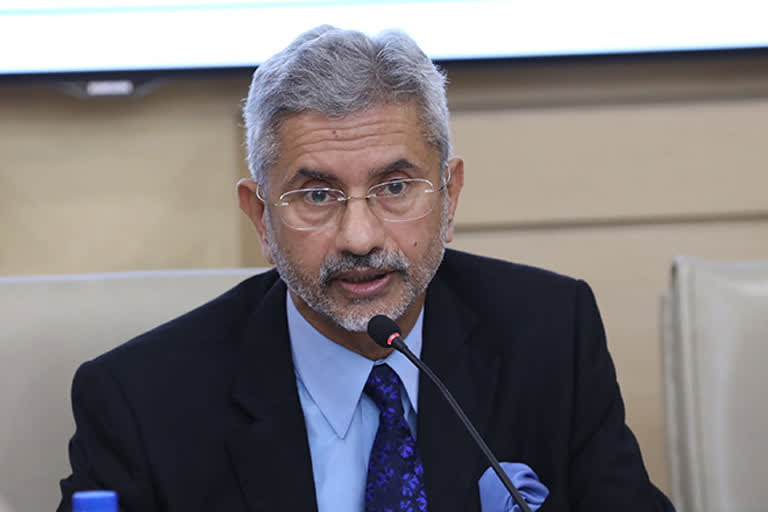New Delhi: The External Affairs Minister S Jaishankar, on Monday, called for an international 'collaborative effort' to address the threat of terrorism at the third edition of the virtually held Deccan Dialogue.
Slamming Pakistan, EAM underlined that India’s immediate neighbourhood has “a particularly egregious problem of state-sponsored cross border terrorism”.
Taking a dig at Pakistan, Jaishankar said, “As regard to terrorism, the era of not my problem came to an end after 9/11, but it has still to provide an international neighbourhood, a particularly egregious example of state-sponsored cross border terrorism."
The minister said that the world was now becoming gradually aware of the global nature of international terrorism.
Underlining that the reform era has made India more contemporary and connected, EAM said that today’s India is far more international than before.
Pakistan has egregious problem of state-sponsored cross border terrorism: S Jaishankar “Our relentless efforts kept it in the spotlight, bringing out related aspects like terror finance, radicalisation and cyber recruitment. The goal remains to reach a comprehensive convention on this subject and we will not rest till that happens,” he said.
Also read: US continue to support India's permanent membership of UNSC: Pompeo
Jaishankar's reference to Pakistan's strategy of state-sponsored terrorism comes days after Islamabad released a 'book on most wanted/ high profile terrorists', notably, omitting the mastermind of 26/11 Mumbai attacks.
India slammed the list and said that the document underlines the fact that Pakistan possesses information on the conspirators of the terror attack.
“We have seen media reports in Pakistan about Pakistan's Federal Investigative Agency (FIA) releasing an updated 'book on most wanted/high profile terrorists' listing several Pakistani nationals involved in the 26/11 Mumbai terror attacks," MEA spokesperson Anurag Srivastava had said earlier.
He also welcomed the importance gained by the Financial Action Task Force (FATF) and expressed satisfaction over the fact that issues such as black money are no longer seen as mere 'law and order' problems.“The FATF has become a more important forum and black money is today firmly on the agenda of the G-20”, he added.
Jaishankar further pointed to pandemics and climate change as the “more existential aspects of globalisation” that will have to be factored into debates about international cooperation and the opening up of countries in future.
Without naming China, the minister said, “On connectivity, we have shaped the debate on the merits of transparency, market viability, environmental friendliness and respect for territorial integrity. And in many parts of the world, ranging from Africa to the Caribbean to the South Pacific, we have helped to strengthen capabilities, offered training and spread best practices”.
“These traits in India’s foreign policy outlook will only be stronger in the aftermath of the Covid pandemic,” he said.
"In the aftermath of the Covid-19 crisis, the immediate focus is on economic recovery and there is greater global awareness about more resilient supply chains. It is up to India to exploit this sentiment for additional growth as the crisis has brought out the importance of international cooperation," he said.
Also read: India remains supportive of Palestinians' aspirations: Jaishankar
"While the world has become more multi-polar and rebalancing has gone beyond economic facets, an architecture with more variables requires better rules, and India must steer the debate towards greater international cooperation at a time when “current institutions are rigid and vested interests are really strong," Jaishankar said.
“In the interim, therefore, we have to look for practical solutions, including ad hoc groups of nations willing to cooperate on selected issues,” he further added during the Deccan Dialogue held under the theme of ‘Crisis and Cooperation: Imperative in the times of Pandemic’.
Deccan Dialogue is an initiative of the Ministry of External Affairs hosted by Indian School of Business, Hyderabad.
The Dialogue is to help all stakeholders comprehend the changes and engage in policy dialogue, where international, national and local stakeholders can come together to collectively brainstorm, address and respond to the crisis.
